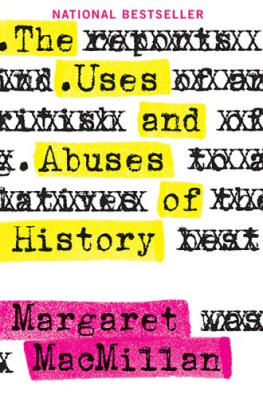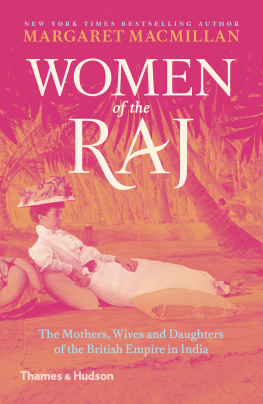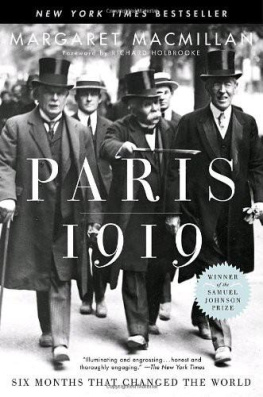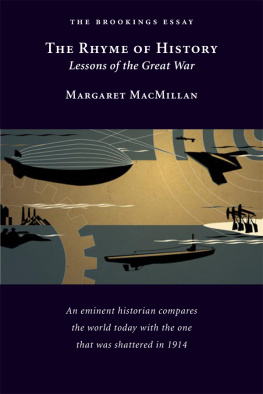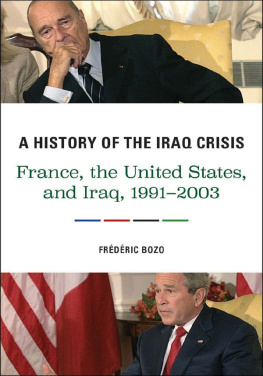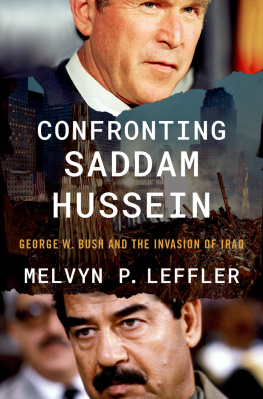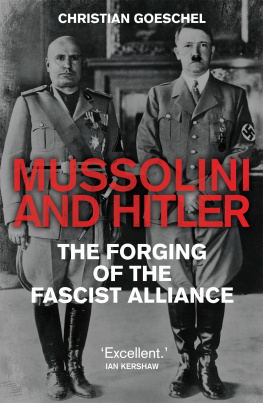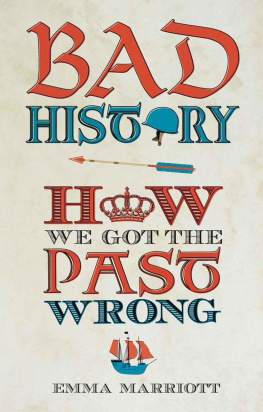Praise forThe Uses and Abuses of History
This is an eminently sensible and humane book, lucidly and enjoyably written and argued. It is addressed to the general reader, and anyone interested in history should find it an engaging, quick read.
The Globe and Mail
The author maintains a tone of measured, reasoned and scholarly approachability This is history used as its own best argument.
Toronto Star
A good quick read a timely read.
Guelph Mercury
Praise for Margaret MacMillan
MacMillans approach to history is to get under the skin of figures, to see them not so much as good or evil but as all-too-human actors struggling with a task of monumental difficulty even as they represented varying and conflicting interests.
The New York Times
MacMillan is a worldly historian with a supreme gift for seeing the big picture and telling the best story.
The Globe and Mail
MacMillan provides a highly readable narrative which
combines detail and approachability.
The Guardian
ALSO BY MARGARET MacMILLAN
Nixon in China: The Week That Changed the World
Women of the Raj
Canada and NATO: Uneasy Past, Uncertain Future
(editor)
Paris 1919: Six Months That Changed the World
Parties Long Estranged: Canada and Australia in the
Twentieth Century (editor)
The Uneasy Century: International Relations 19001990
(editor)
Canadas House: Rideau Hall and the Invention
of a Canadian Home
(with Marjorie Harris and Anne L. Desjardins)
Extraordinary Canadians: Stephen Leacock
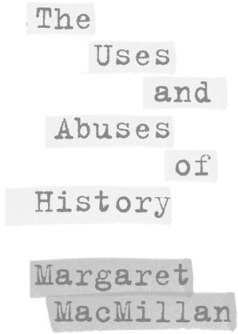
Based on the Joanne Goodman Lecture Series of the
University of Western Ontario

PENGUIN CANADA
Published by the Penguin Group
Penguin Group (Canada), 90 Eglinton Avenue East, Suite 700,
Toronto, Ontario, Canada M4P 2Y3 (a division of Pearson Canada Inc.)
Penguin Group (USA) Inc., 375 Hudson Street, New York, New York 10014, U.S.A.
Penguin Books Ltd, 80 Strand, London WC2R 0RL, England
Penguin Ireland, 25 St Stephens Green, Dublin 2, Ireland (a division of Penguin Books Ltd)
Penguin Group (Australia), 250 Camberwell Road, Camberwell, Victoria 3124, Australia
(a division of Pearson Australia Group Pty Ltd)
Penguin Books India Pvt Ltd, 11 Community Centre, Panchsheel Park,
New Delhi 110 017, India
Penguin Group (NZ), 67 Apollo Drive, Rosedale, North Shore 0745, Auckland, New Zealand
(a division of Pearson New Zealand Ltd)
Penguin Books (South Africa) (Pty) Ltd, 24 Sturdee Avenue, Rosebank,
Johannesburg 2196, South Africa
Penguin Books Ltd, Registered Offices: 80 Strand, London WC2R 0RL, England
First published in a Viking Canada hardcover by Penguin Group (Canada),
a division of Pearson Canada Inc., 2008
Published in this edition, 2009
1 2 3 4 5 6 7 8 9 10 (WEB)
Copyright Margaret MacMillan, 2008
All rights reserved. Without limiting the rights under copyright reserved above,
no part of this publication may be reproduced, stored in or introduced into a retrieval system,
or transmitted in any form or by any means (electronic, mechanical, photocopying,
recording or otherwise), without the prior written permission of both the copyright owner
and the above publisher of this book.
Manufactured in Canada.
ISBN: 978-0-14-305478-8
Library and Archives Canada Cataloguing in Publication data available
upon request to the publisher.
Except in the United States of America, this book is sold subject to the condition that it shall
not, by way of trade or otherwise, be lent, re-sold, hired out, or otherwise circulated without
the publishers prior consent in any form of binding or cover other than that in which it is
published and without a similar condition including this condition being imposed on the
subsequent purchaser.
Visit the Penguin Group (Canada) website at www.penguin.ca
Special and corporate bulk purchase rates available; please see
www.penguin.ca/corporatesales or call 1-800-810-3104, ext. 477 or 474
The Joanne Goodman Lecture Series was established by
Joannes family and friends to perpetuate the memory of her
blithe spirit, her quest for knowledge, and the rewarding
years she spent at the University of Western Ontario

INTRODUCTION
H ISTORY IS SOMETHING we all do, even if, like the man who discovered he was writing prose, we do not always realize it. We want to make sense of our own lives and often we wonder about our place in our own societies and how we got to be here. So we tell ourselves stories, not always true ones, and we ask questions about ourselves. Such stories and questions inevitably lead us to the past. How did I grow up to be the person I am? Who were my parents? My grandparents? As individuals, we are all, at least in part, products of our own histories, which include our geographical place, our times, our social classes, and our family backgrounds. I am a Canadian who has grown up in this country and so have enjoyed an extraordinary period, unusual in much of the worlds history, of peace, stability, and prosperity. That has surely shaped the ways in which I look at the world, perhaps with more optimism about things getting better than I might have if I had grown up in Afghanistan or Somalia. And I am also a product of my parents and grandparents history. I grew up with some knowledge, incomplete and fragmentary to be sure, of World War II, which my father fought in, and of World War I, which drew in both my grandfathers.
We use history to understand ourselves, and we ought to use it to understand others. If we find out that an acquaintance has suffered a catastrophe, that knowledge helps us to avoid causing him or her pain. (If we find that they have enjoyed great good luck, that may affect how we treat them in another way!) We can never assume that we are all the same, and that is as true in business and politics as it is in personal relations. How can we understand the often passionate feelings of French nationalists in Quebec if we do not know something about the past that has shaped and continues to shape them? Or the mixture of resentment and pride that formerly poor provinces such as Alberta and Newfoundland feel toward central Canada now that they have struck oil? In international affairs, how can we understand the deep hostility between Palestinians and Israelis without knowing something of their tragic conflicts?
History is bunk, Henry Ford famously said, and it is sometimes hard for us in North America to recognize that history is not a dead subject. It does not lie there safely in the past for us to look at when the mood takes us. History can be helpful; it can also be very dangerous. It is wiser to think of history, not as a pile of dead leaves or a collection of dusty artifacts, but as a pool, sometimes benign, often sulphurous, which lies under the present, silently shaping our institutions, our ways of thought, our likes and dislikes. We call on it, even in North America, for validation and for lessons and advice. Validation, whether of group identities or for demands, or justification, almost always comes from using the past. You feel your life has a meaning if you are part of a much larger group, which predated your existence and which will survive you (carrying, however, some of your essence into the future). Sometimes we abuse history, creating bad or false histories to justify treating others badly, seizing their land, for example, or killing them. There are also many lessons and much advice offered by history, and it is easy to pick and choose what you want. The past can be used for almost anything you want to do in the present. We abuse it when we create lies about the past or write histories that show only one perspective. We can draw our lessons carefully or badly. That does not mean we should not look to history for understanding, support, and help; it does mean that we should do so with care.
Next page
